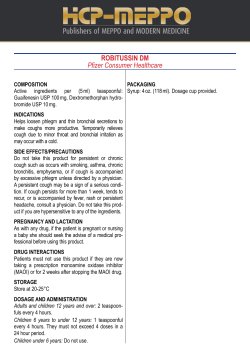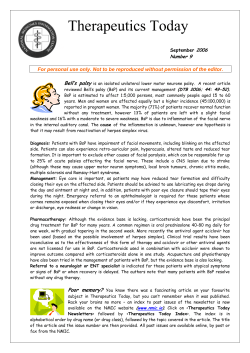
Where do I go for further information?
Dana’s story Baby Dana was born a happy, healthy girl. She was breastfeeding well and putting on weight. Australian Capital Territory South Australia ACT Immunisation Inquiry Line (02) 6205 2300 South Australia Immunisation Section 1300 232 272 New South Wales Soon after arriving, Dana had her first coughing bout where she turned blue and needed oxygen. On the third day at hospital, Dana developed pneumonia and she was placed on a ventilator. She was transferred to intensive care. Contact the local Public Health Units (look under “Health” in the White Pages) On the fifth day, the whooping cough toxins caused her organs to shut down and Dana had a cardiac arrest. She was only 32 days old when she died. Nobody knows where Dana was infected with whooping cough. It may have been at her sibling’s school or preschool. A loving relative or friend, or a complete stranger may have unknowingly passed the infection on. Whooping cough affects people of all ages, but the real danger of the devastating disease is on young babies like Dana. SA (24-hour) Parent Help-line (Child and Youth Health) 1300 364 100 Northern Territory Tasmania (08) 8922 8044 1800 671 738 Queensland Victoria Contact the local Public Health Units (look under “Health” in the White Pages) or 13 HEALTH (13 43 25 84) 24 hour health hotline 1300 882 008 the disease Western Australia (08) 9321 1312 PROTECT your child Websites National Centre for Immunisation Research & Surveillance www.ncirs.edu.au Immunise Australia Program (Australian Government Department of Health and Ageing) www.immunise.health.gov.au That’s why it’s up to everyone to IDENTIFY • PROTECT • PREVENT IDENTIFY This material is reproduced by the Department of Health and Ageing under arrangement with the NSW Ministry of Health. All information in this publication is correct as at July 2012 D0882 July 2012 At 11 days old, she developed a blocked nose and was unsettled at night. Dana’s parents acted quickly and saw the GP. When she was three weeks old, Dana developed an occasional cough and appeared to gag, and her parents returned to the GP. As soon as Dana tested positive for whooping cough, she went straight to hospital. Where do I go for further information? PREVENT the spread IDENTIFY PROTECT What is whooping cough? Protect your baby • W hooping cough (or pertussis) is a serious respiratory infection that causes a long coughing illness. In babies, it can lead to pneumonia and brain damage. • N ewborns are not immune until they have had their whooping cough vaccines. To protect them until they are immune, keep people with a cough away from your baby. • W hooping cough can be life-threatening for babies. Newborns are not immune and they often get extremely sick. • T he vaccine for babies is given at 2, 4 and 6 months. The first dose can be given as early as 6 weeks. Immunise your baby on time so they can be protected as soon as possible. If your baby’s vaccines are overdue, speak to your GP about catching up. PROTECT • O lder children and adults can get whooping cough and can spread it to others, including babies. • A ntibiotics can prevent whooping cough spreading if given early but the cough often continues after treatment. What are the symptoms? • W hooping cough starts like a cold with a blocked or runny nose, sneezing, a mild fever and an occasional cough. • T he cough gets worse and severe bouts of uncontrollable coughing develop. Coughing bouts can be followed by vomiting, choking or taking a big gasping breath which causes a “whooping” sound. The cough can last for many weeks and can be worse at night. PREVENT • S ome newborns don’t cough at all but stop breathing and turn blue. • O lder children and adults may just have a mild cough that doesn’t go away. PREVENT • W hooping cough vaccine is effective but doesn’t protect all babies. You still need to watch out, even if your baby is immunised. Older children • B y immunising older children with boosters at 4 years and in high school, you give them some protection against whooping cough. This also helps to reduce spread to others. • C heck if your child has been vaccinated. Speak to your immunisation provider or GP or ring the Australian Childhood Immunisation Register on 1800 653 809. • R emember that even immunised children can sometimes catch whooping cough. Adults How is whooping cough spread? • A dults can get whooping cough and can spread the infection to babies. They may just have mild symptoms and may not realise that their cough could cause harm. • A person with whooping cough can spread it to others in the first 3 weeks of illness. Bacteria coughed into the air can be inhaled by babies, children or adults nearby. These people are then in danger of getting whooping cough. • If you’re a new parent, you can top-up your immunity by getting a whooping cough booster. Boosters are also recommended for grandparents, couples planning a pregnancy, and for child care workers and health care workers. • W hooping cough vaccines can be accessed from your GP, Aboriginal Medical Service, community health centre or council clinic. PREVENT How can I prevent the spread of whooping cough? • W hooping cough is highly infectious in the first 3 weeks. It spreads easily through families, childcare centres and schools, so it’s important to act fast. • A nyone with symptoms should see a doctor as soon as possible. Your GP can test for whooping cough. Early diagnosis is especially important for new parents and people who have regular contact with babies. • If whooping cough is detected early enough, your doctor may prescribe a course of antibiotics. After 5 days of treatment, enough bacteria are killed to stop spread to others. • In some situations, other people who have been in contact with an infectious person may also need antibiotics to help prevent the infection, especially if they are babies or if they have close contact with babies. • P eople diagnosed with whooping cough should stay away from work, school or childcare until no longer infectious. Ask your doctor when it’s safe to return.
© Copyright 2025












